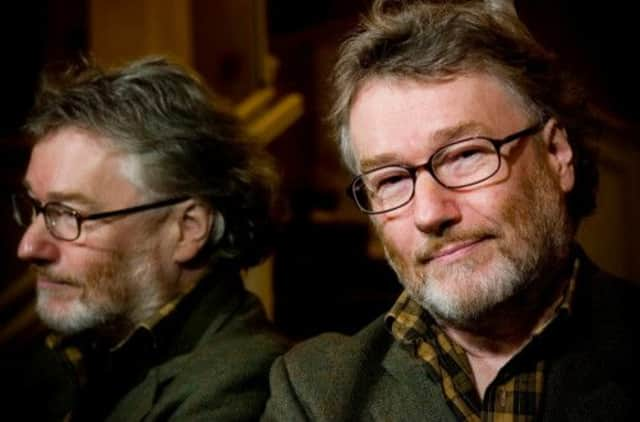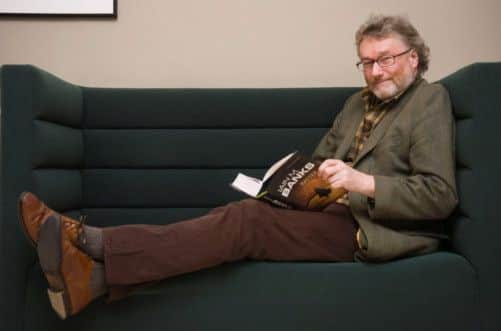Iain Gray: Iain Banks a writer of the first rank


A year ago I confessed in The Scotsman that his science fiction novels are my favourite contemporary fiction, and every devoted reader feels they have a kind of relationship with the novelist.
This was a tricky one though, because I admitted that when I was Scottish Labour leader, my advisers vetoed an Iain M Banks novel as my “book of the year”, for fear of sounding geeky, and told this in an interview, Banks was brutal. It confirmed what he thought about politicians like me, that “you can’t even believe them about what they read”. I had acknowledged in the piece that he was no supporter of Labour, especially after Iraq, and he certainly did not moderate his views in his final interviews.
Advertisement
Hide AdAdvertisement
Hide AdI long ago decided that you can love a book but loathe the author. For Whom the Bell Tolls is brilliant, but I would have hated Hemingway with his ridiculous “something to prove” machismo. Iain Banks thought TS Eliot a genius and The Waste Land provided two of his book titles, but he loathed the man. This was the opposite, wondering if it mattered at all what a favourite writer, who seemed very likeable, thought of me, the reader, especially as neither of us actually knew each other.


One thing we agreed on was the wish that Banks’s final novel had been science fiction. He told the Guardian that “the real best way to sign off would have been with a great big rollicking Culture novel”, yet most of the coverage of Banks’s death ignored his science fiction, implicitly echoing the views of my erstwhile advisers. Nicola Sturgeon tweeted a photo of her bookshelf, proudly exhibiting the complete works of Iain Banks, but no SF.
On Radio 4 Brian Aldiss expressed delight that a science fiction writer had made it to the front page of the Times, only to be forced by the presenter to accept that Banks would not have received that accolade had he written only SF.
The Scottish tributes rightly placed Banks’s mainstream fiction in the pantheon of Scottish literature, although he was a novelist who wrote from Scottish roots and sensibilities, but as a platform to bigger themes. Any Scot reading The Bridge knows it is about the Forth Bridge, but it speaks to readers around the world who will never see the bridge, being about much more than that.
It is in the SF novels though, that Banks’s astonishing imagination really takes flight, and the biggest themes of all are examined. This is especially true of the novels about the Culture, an anarchic, liberal, abundant civilization in the future spanning large volumes of the Universe, and loosely managed by “Minds”, artificial intelligences of unimaginable capacity and a deeply ironic sense of humour.
The Culture is clearly a utopian construct, and Banks himself described it as his idea of “as good as we are going to get”. Its well-balanced citizens who want for nothing and devote themselves to hedonism, lifelong study of esoterica or dangerous sports are reminiscent of the inhabitants of Aldous Huxley’s “Island”, while Banks uses their intergalactic interactions with other civilizations in various stages of development to imagine “what if” just as HG Wells did with travel through time.
In Player of Games a master of complex games yearns to turn his game playing skills to the greater consequences of the real world, just like Knecht in Hesse’s Nobel Prize-winner The Glass Bead Game. Perhaps the Culture’s Minds are even a futuristic conception of the Philosopher Kings of the first utopian work, Plato’s Republic.
Heady company for any novelist, but Banks earned that place and we should be proud to have had a Scottish writer creating in this tradition.
Advertisement
Hide AdAdvertisement
Hide AdThe Culture has a dystopian side too, not least because it cannot leave less advanced civilizations alone, constantly interfering in them for their own good. They even have a shadowy secret service, Special Circumstances, to do this, often with catastrophic consequences and loss of life in the short term. Agonising over the rightness of such adventures is a theme running through the series, and the main protagonists are often deeply conflicted about their own actions for the greater good.
Early Culture novels predated Iraq, but the debate within them continued through it to the final one. The Culture precept that “Money is a sign of poverty” in any civilization is another sign that Banks did use these novels to explore his feelings about today’s politics. As with the best SF he also intuitively foresaw new technology. Consider Phlebas was drafted before mobile phones, never mind the internet, but the idea of global databases and information flows is central to the Culture. Even today’s Edward Snowden controversy is prefigured in disputes about whether Minds, which can monitor all data, should do so.
Banks’s final book has a character dying of cancer, although the story was largely written before his own diagnosis. With hindsight, the SF novels have also gained new poignancy, not least because Culture has conquered disease and its citizens live for as long as they choose, usually several centuries.
Moreover, two are written around pieces of music, one a complex sonata the playing of which is the heroine’s chosen “life task”. Look to Windward culminates in the premiere of a massive symphony written to coincide with the arrival of light from the destruction of distant star centuries before. Not only has Banks ascribed his cancer to a cosmic ray from a star which exploded hundreds of years ago, but his last TV interview revealed composing music as his true, but private passion, when he played a fragment of his own symphony, the completion of which was the task of his remaining days.
Heaven and Hell also feature in the novels. One is about a war between civilizations over whether Hell exists or not, a farfetched idea, until you remember that we fight real wars for exactly those kind of reasons. Banks was an atheist, and Hell turns out to be faked, but the novels are much more ambivalent about “subliming”, moving on to another mode of existence which is assumed to be, well, sublime, but the exact nature of which remains mysterious.
The last Culture novel is all about a civilization subliming en masse, although since this follows a referendum and Banks was a vocal supporter of a Yes vote next year, it may have been about something else altogether. Anyway, like every Culture novel, it is a fantastic story.
I suppose that I put my politics into the public realm, and Iain Banks was entitled to disagree with them. But he wrote his into the Culture books, and I am entitled to love them, and to find within them a nuanced, conflicted and ambivalent view of life that feels authentic to me. That’s the reader’s privilege.
But Iain, if by chance you were wrong about that heaven and hell business, and you are hanging out with Papa Hemingway, then don’t take any bulls**t from him because you wrote SF. He was the master craftsman of the “one true sentence”, but he never had your limitless imagination. We will miss it.
• Iain Gray is Labour MSP for East Lothian